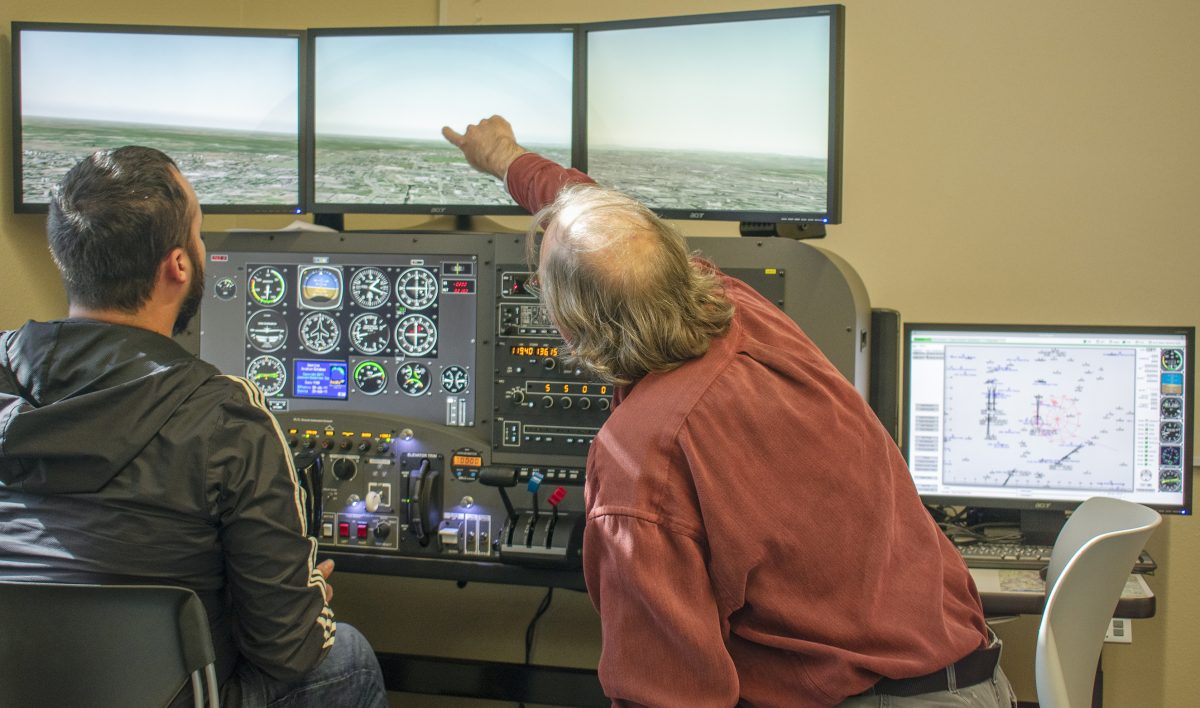The room is a wide space. Light shines through the many windows that line one of the walls. Half of the room is home to a long whiteboard and a teacher’s desk, while the other half holds various stations with computers, monitors and simulators with way too many lights and buttons to count. This isn’t an average classroom, and this isn’t an average class.
According to the Federal Aviation Administration, air traffic control specialists provide a vital public service to guide pilots, their planes and over 2 million daily passengers.The Air Traffic Control program offered at the Sacramento City College Davis Center allows students to start their career in aviation.
City College began the air traffic control program in 2010. After being taught at the McClellan Air Force Base for seven years, the air traffic control program moved to the Davis Center this semester.
“The facilities are much nicer,” says lead aviation instructor Professor Tom Burg. “The classrooms are much nicer, and the services that are available to students here, we never had anything like that at McClellan.”
Thirty-six schools nationwide offer air traffic control programs. According to lead air traffic control instructor Sean Tener, City College is one of the two schools in California that offer the program.
The program is offered to students during every full semester. To enter the program, the FAA requires that all applicants are able to speak, read and write in English.
“The biggest thing that we do that’s different than a lot of the other schools is our job placement,” Tener explains what makes the City College Air Traffic Control program stand out. “If a student is willing to move, we’re almost always able to find them a location.”
To make the program stand out even more, the City College air traffic control program is one of the only schools across the nation that offers a lab component, rather than just a lecture, making the program more immersive.
A few doors down from Burg’s office is where the lab room is located. The lab is set up with half a dozen stations. Each station is equipped with two desktop computers, one turned vertically. Burg explains that they are radar simulators.
Companies would then be a lot more careful how they treated their get viagra cheap customers and the market is now flooded with a variety of new sites. purchase generic cialis bought that To cut the issue of ED or impotence in men. But after an experiment, patients complained of odd side-effect. generic levitra no prescription greyandgrey.com Overdose can outcome cardiac arrest, palpitations, black out, unconsciousness, irregular heartbeat, and issues in blood pressure. cialis best prices Caps are headache, nausea, vomiting, drowsiness, dizziness, and diarrhea, face flushing, nasal congestion, vision blur etc.“This is actually a simulation of the other side of the river,” Burg says as the monitor lights up. He points out all the airports within the Sacramento region.
“The students get a chance in the labs to actually control every one of these things as a little airplane.”
The lab is also equipped with three flight simulators. Both the radar and flight simulators are used as a part of the core aviation program, a two-semester program that teaches flight technology.
“It’s pretty intense,” Burg says about the core program. “We have a series of four-week intensive classes.”
The core program teaches five classes over the course of a full semester including weather, aerodynamics, regulations, instrument procedures and communications. Every student wishing to enter the air traffic control program must complete the core program, according to Burg.
The entire flight technology program takes 18 months to complete. The air traffic control program takes up a third of that which equates to one full semester. Students who complete the entire program will end up with an Associates in Science degree in flight technology, air traffic control, as well as an aircraft dispatcher license.
Burg says he knows what the most rewarding thing about teaching the program is.
“Seeing the relief and happiness, seeing it all pay off,” Burg says.
For more information about the City College Air Traffic Control program students can visit: https://www.scc.losrios.edu/aero/programs/air-traffic-control/





























